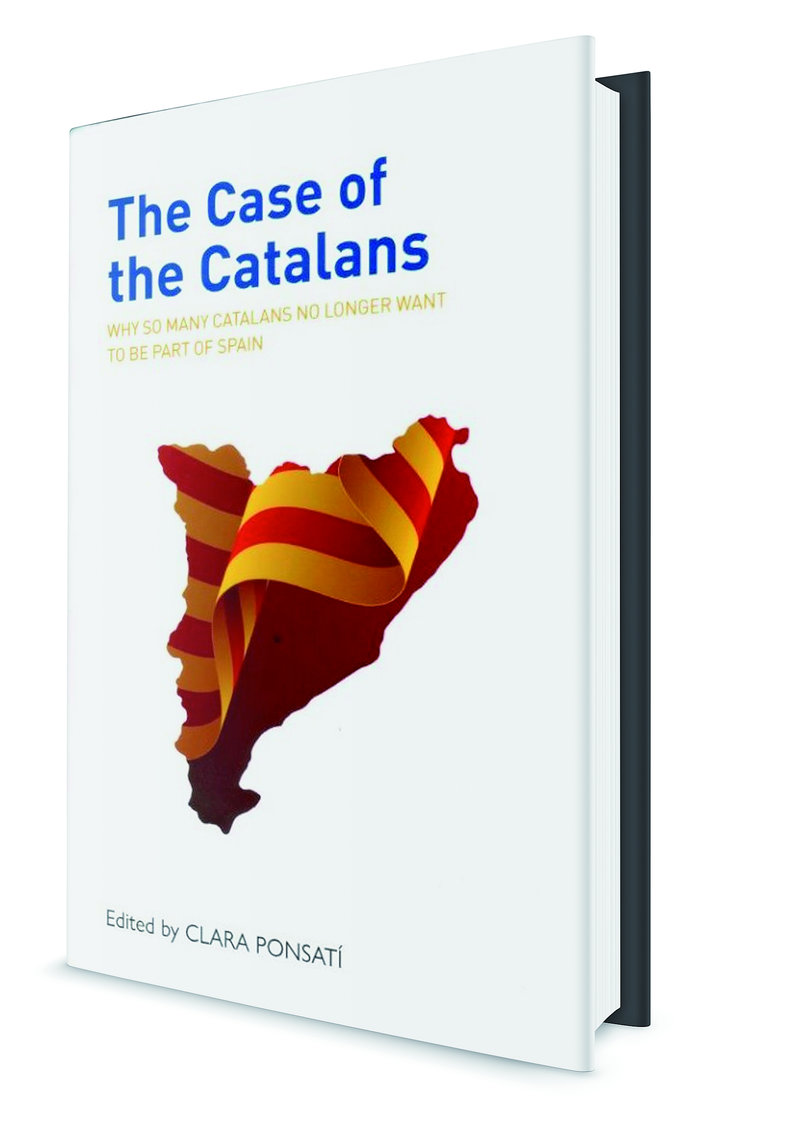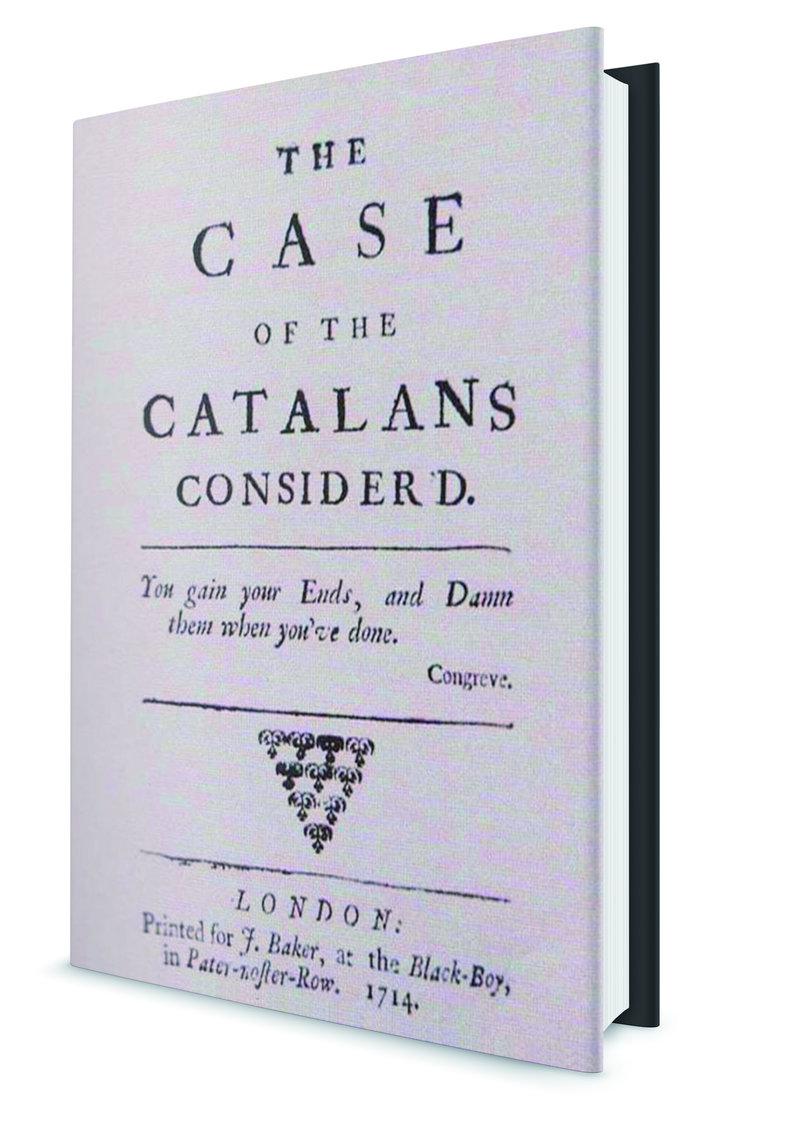Gain your ends - and damn them
This book of essays from the Edinburgh publisher Luath is designed to explain the case for Catalan independence to the English-speaking world
The book’s title is taken from a pamphlet published in London in 1714, which praised Catalan resistance in defence of their institutions and freedom and which attacked the Tory Government for its betrayal of England’s commitment to defend Catalonia against the Bourbon King Felipe V. The pamphlet’s cover features a scathing quote on English ruling-class hypocrisy: “You gain your Ends, and Damn them when you’ve done”.
The Case of The Catalans covers in six chapters six basic facets of the independence struggle. Clara Ponsatí writes the first, on the limits of Spanish democracy. Albert Carreras tackles history in Chapter 2. The constitutional dispute is glossed by Carles Boix and Antoni Abat in Chapter 3. Enriqueta Aragonès and Jordi Muñoz explain the recent rise in support for independence in Chapter 4. Chapter 5, by Xavier Cuadras-Morató, discusses the economy. How often, in paternalistic fashion, do Spanish economists and politicians lament that Catalonia’s economy would be destroyed if the country were to become independent! What they really mean is that the Spanish state would be poorer. Finally, in Chapter 6, Carles Boix discusses self-determination.
No Safe Harbour
Chapter One is extremely clear and well written. It sets out the “four main culprits” for the “political deadlock between Catalonia and Spain” (p.48). The first is the context of the drafting of the 1978 Spanish Constitution, overshadowed by the still-intact influence of the Franco dictatorship. Several key articles were directly inserted by the Crown and the Army. Second, Ponsatí explains the lack of protection of national minorities against the Spanish majority. Third, she lambasts the severe malfunction of Spain’s judiciary, with no checks against direct political interference in the courts. And fourth, the Constitutional Court, in theory existing to interpret ambiguities in the Constitution, has become a weapon in the hands of Spanish nationalism.
Chapter Two gives a potted history of Catalonia from mediaeval times. Carreras’ account of the 1936-39 Civil War is too brief and is misleading. Surprisingly, his account of the 1970s Transition and the 1978 Constitution totally contradicts Ponsatí’s view in Chapter One. Carreras gives a right-wing view of the Transition as successfully restoring Catalan institutions and self-government. He argues that, with the 1979 Statute of Autonomy and Pujol’s election as President in 1980, “Catalan history seemed to have reached a safe harbour” (p.76). In fact, Tarradellas was installed by Madrid as President, without powers, of the Generalitat in 1977 with no democratic mandate. The June 1977 general election in Catalonia had given a majority to the Socialist (PSC) and Communist (PSUC) parties.
Chapter 3 analyses the Constitutional Court and its deficiencies as an arbiter of the relationship between the historic nations of the state and the central state, deliberately left ambiguous in certain phrasing of the 1978 Constitution. The authors highlight Pujol’s skill “fishing in the Spanish Coffee Pot” (!!) to obtain more and more devolution and tax revenue for Catalonia. The Constitutional Court’s decision against the Catalan Statute of 2006, despite prior political approval by the Catalan and Spanish Parliaments, means “the ’Autonomic State’ has collapsed, dragging down with it the influence of the Constitutional Court” (p.94).
Chapter 4 explains the growth in support for independence in the last decade. The two authors emphasise the importance of grass-roots movements, which forced the main Catalan parties to redefine their programmes. The movement from below shattered Convergència i Unió into several parties and split the Socialist Party. The chapter emphasizes the cross-generational support for independence, which gives the lie to Spanish nationalists’ argument that independence support is due to indoctrination of the young through the Catalan education system.
Chapter 5 is a fascinating discussion of the economic consequences of the creation of a new state. Among so many unknowns, Xavier Cuadras-Montó concludes that “greater political power means better economic opportunities” (p.125). He does not ignore, however, the many negative consequences of secession without agreement between Spain and Catalonia, the most likely scenario. However, a key defect, he omits any reference to global warming and the need to transform the capitalist economic model. His conservative approach supposes that economies can continue to grow.
In Chapter Six, Carles Boix looks at self-determination in international law, from Woodrow Wilson’s declarations after the First World War to the experiences of Scotland, Kosovo, the Jura and Quebec in recent decades. He explains the conflicts between the ideas of territorial integrity and self-determination.
The chapters are all written by Catalans in English, one assumes, as no translators are credited. Unfortunately, this has led to numbers of minor errors and cumbersome formulations. Correctors should have been employed. Though the book is perfectly comprehensible, reading would be easier were the text more fluent.
No Fireworks
The book’s very worthwhile objective is to influence the English-speaking world. However, though every person won to support for the Catalan cause is very welcome, the struggle will not be won or lost in the press, parliaments and courts of Europe. The Spanish state, not a new Catalan state, will always be the principal ally of the other main states of the European Union. Realpolitik, i.e. the interests of the powerful, will prevail in the chancelleries of Europe now just as it did in 1713/14. If the struggle is to be won, it will depend on a massive, radical mobilisation that can win support from voters for unionist parties. And this perspective is lacking in the book.
The Case of the Catalans gives the arguments for independence, but not the strategy of how to win it: just as, on October 27 2017, the Catalan government had lots of ideas why independence was a good option, but a dearth of plans to actually put it into practice. Instead of fireworks enthusing the crowds in the Plaça Sant Jaume that night, independence went off like a damp squib. The Catalan Government’s Ministers did not go to work in defiance of Rajoy’s suspension of Catalan autonomy. They did not call on the mass movement to defend the new Republic. They failed to test the waters. This book’s authors suffer from the same lack of strategy and of confidence in the mass movement.
These critical comments are part of the debate. They should not detract from the qualities of this succinct, hard-hitting book. It is a valuable source of statistics, information and arguments for supporters of independence.
book review
Distinguished academics
The Case of the Catalans is edited and introduced by Clara Ponsatí, Euro MP, former Minister of Education in Puigdemont’s 2016-17 government and political exile in Scotland. She worked for many years as Professor of Economics at the University of St. Andrew’s.
The other contributors are teachers and researchers in Barcelona’s several universities, experts in their fields and closely involved with the fight for independence. Of the seven authors, four - Ponsatí, Aragonès, Carreras and Cuadras-Morató - are economists; Antoni Abat is a Constitutional Law expert; and Muñoz and Boix are Politics professors.







